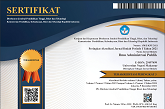Strategy In Public Service
(1) Universitas Negeri Makassar
(2) Ilmu pemerintahan FHISIP Universitas Terbuka
(*) Corresponding Author
DOI: https://doi.org/10.26858/jiap.v13i1.39179
Abstract
This study aims to determine the implementation of Know Your Customers (KYC) and Citizen Charter (Service Contract) strategies in increasing employee responsiveness in collecting retribution for Bone Regency. The type of research used is descriptive qualitative. Data collection used observation techniques, interviews, and documentation. The analysis technique is carried out through data collection, data reduction, data presentation, and concluding. The results of this study indicate that the implementation of the public service responsiveness strategy of Bone Regency in collecting retribution is considered to be less responsive based on each of the 3 indicators of the two responsive strategies, there is one indicator on the Know Your Customers strategy which is considered not good, namely approach, while two other indicators are considered good, namely (surveys, observations, interviews) and know customers. The indicators on the three Citizen Charter strategies (Service Contracts) are considered to be still not good, namely service users as the centre of attention, service contracts, and system determination. Of course, there are still shortcomings that need attention, namely paying more attention to the needs of traders, following up on merchant complaints quickly, and providing services according to existing regional regulations. If this is allowed to continue, it will harm the implementation of public services in the future, bearing in mind that the increasing needs of traders must be supported by managers who are alert and responsible for their main tasks and functions, so that responsive services can be created.
Keywords
Full Text:
PDFReferences
Abdul Rohman. (2020). Bureaucratic Politics of Appointment and Dismissal of Post Pilkades Village Officials. Indonesian Governance Journal : Political-Government Studies, 3(2), 127–138. https://doi.org/10.24905/igj.v3i2.1571
Arifin, B., Wicaksono, E., Tenrini, RH, Wardhana, IW, Setiawan, H., Damayanty, SA, Solikin, A., Suhendra, M ., Saputra, AH, Ariutama, GA, Djunedi, P., Rahman, AB, & Handoko, R. (2020). Village funds, village-owned-enterprises, and employment: Evidence from Indonesia. Journal of Rural Studies, 79, 382–394. https://doi.org/10.1016/J.JRURSTUD.2020.08.052
Bircan, İ., & Gençler, F. (2015). Analysis of Innovation-Based Human Resources for Sustainable Development. Procedia - Social and Behavioral Sciences, 195(312), 1348–1354. https://doi.org/10.1016/j.sbspro.2015.06.321
Boyne, G. A. (2003). What is public service improvement?. Public administration, 81(2), 211-227.
Dwiyanto, A. (2021). Reformasi birokrasi publik di Indonesia. UGM PRESS.
Faturahman, BM (2018). Actualization of Democratic Values in the Recruitment and Selection of Village Officials. Journal of Social Politics, 4(1), 132. https://doi.org/10.22219/sospol.v4i1.5557
Hastangka, H., Tjahyadi, S., Djalu Sembada, A., & Sinaga, YT (2019). Education for Sustainable Development (ESD) – Pancasila in Towangsan Village: The Paradigm of Sustainable Development. Journal of Community Engagement (Indonesian Journal of Community Engagement), 4(2), 159. https://doi.org/10.22146/jpkm.30134
Iskandar, AH (2020). Village SDGs: Accelerated Achievement of Sustainable National Development Goals. Indonesian Torch Library Foundation.
Ismail, M., Widagdo, AK, & Widodo, A. (2016). Village Fund Management Accounting System. Journal of Economics and Business, 19(2), 323–340. https://d1wqtxts1xzle7.cloudfront.net/57861699/336-Article_Text
Jamaluddin, Y., Sumaryana, A., Rusli, B., & Buchari, RA (2018). Analysis of the Impact of the Management and Use of Village Funds on Regional Development. JPPUMA: UMA Journal of Governance and Social Politics, 6(1), 14–24. https://ojs.uma.ac.id/index.php/jppuma/article/view/1520
Kemendesa. (2021). Village SGDs and the Reconstruction of the Sustainable Development Paradigm. https://sdgsdesa.kemendesa.go.id/sdgs-desa-dan-reconstruction-paradigma-pembelian-berkeContinuan/
Lewis, C. W., & Gilman, S. C. (2005). The ethics challenge in public service: A problem-solving guide. John Wiley & Sons.
Lovelock, C. H. (1983). Classifying services to gain strategic marketing insights. Journal of marketing, 47(3), 9-20.
Miles, M. B., Huberman, A. M., & Saldaña, J. (2018). Qualitative data analysis: A methods sourcebook. Sage publications.
Miles, MB, Huberman, AM, & Saldaña, J. (2018). Qualitative data analysis: A methods sourcebook. Sage publications.
Notoatmodjo, S. (2008). Health and Human Resource Development. Kesmas: National Journal of Public Health, 2(5), 195–199. https://doi.org/10.21109/kesmas.v2i5.249
Permatasari, P., Ilman, AS, Tilt, CA, Lestari, D., Islam, S., Tenrini, RH, Rahman, AB, Samosir, AP, & Wardhana, IW (2021). The village fund program in Indonesia: Measuring the effectiveness and alignment to sustainable development goals. Sustainability (Switzerland), 13(21). https://doi.org/10.3390/su132112294
Siregar, R. (2017). Human Resources in National Development. Proceedings of the 2017 Annual National Seminar on the Faculty of Social Sciences, Medan State University, 378–381.
Sulistia, R. (2017). Village Government Capacity in Managing Dompas Village Funds, Bukit Batu District, Bengkalis Regency in 2015. JOM FISIP, 4(1), 1–19. https://media.neliti.com/media/publications/209286-kapasitas-government-desa-dalam-mengelol.pdf
Yulaswati, V. (2021). Roles and Opportunities for Utilizing Data and Information to Realize Sustainable City Development and Achievement of TPS/SDGs Targets. https://www.youtube.com/watch?v=_ZJX-ulm4TQ
Article Metrics
Abstract view : 160 times | PDF view : 34 timesRefbacks
- There are currently no refbacks.
Copyright (c) 2023 Novayanti Sopia Rukmana

This work is licensed under a Creative Commons Attribution 4.0 International License.
Diterbitkan oleh:
Program Studi Ilmu Administrasi Publik
Program Pascasarjana Universitas Negeri Makassar
JIAP Index By:

This work is licensed under a Creative Commons Attribution 4.0 International License.









